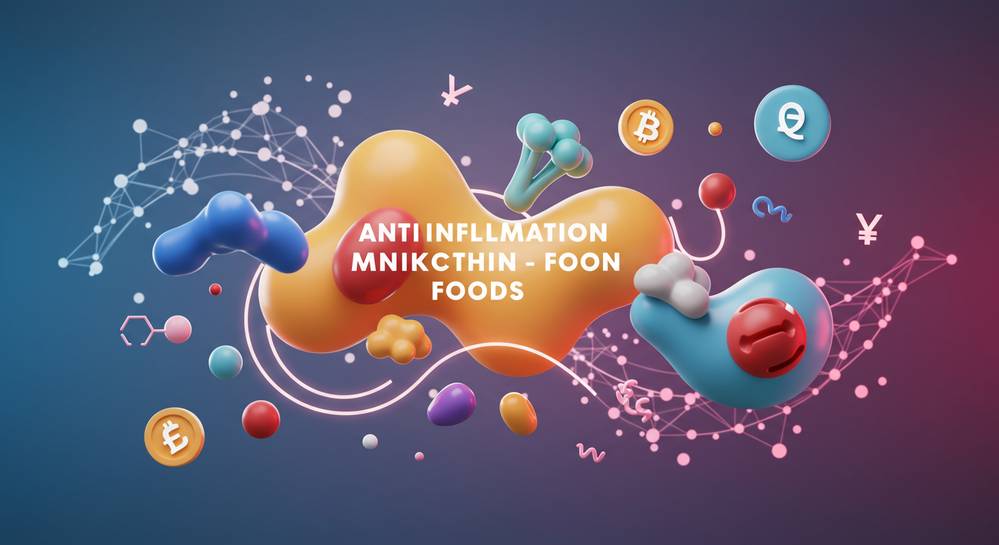Chronic inflammation is a silent threat impacting countless individuals, contributing to various health issues from joint pain to cardiovascular concerns. Fortunately, one of the most powerful tools we have to manage and reduce inflammation lies in our daily diet. Understanding and incorporating an anti inflammatory foods list into your lifestyle can significantly enhance your well-being, providing a natural pathway to better health and vitality. This guide will explore the foods that actively fight inflammation, helping you make informed dietary choices.
Understanding Chronic Inflammation and Its Health Impact

Essential Anti-Inflammatory Foods List
Incorporating specific foods into your daily diet offers a powerful strategy to combat chronic inflammation. These foods are rich in compounds like antioxidants, polyphenols, and omega-3 fatty acids, which actively work to modulate the body’s inflammatory responses. Understanding this anti inflammatory foods list is crucial for long-term health benefits.
- Berries: Strawberries, blueberries, raspberries, and blackberries are packed with anthocyanins, potent antioxidants that reduce inflammation and protect cells.
- Fatty Fish: Salmon, mackerel, sardines, and tuna are excellent sources of omega-3 fatty acids, particularly EPA and DHA, known for their strong anti-inflammatory effects.
- Leafy Green Vegetables: Spinach, kale, and collard greens provide vitamins A, C, and K, along with various antioxidants that help calm inflammatory pathways.
- Turmeric: This vibrant spice contains curcumin, a compound extensively studied for its powerful anti-inflammatory properties, often compared to some anti-inflammatory drugs.
- Extra Virgin Olive Oil: A cornerstone of the Mediterranean diet, it contains oleocanthal, which acts similarly to Ibuprofen in reducing inflammation.
- Green Tea: Rich in polyphenols, especially epigallocatechin gallate (EGCG), green tea has significant antioxidant and anti-inflammatory benefits.
Making these dietary choices consistently supports a healthier inflammatory balance. Many of these foods also provide essential fiber, vital for a robust gut microbiome, which plays a critical role in overall immune function and reducing systemic inflammation. For more on this, explore the importance of fiber for digestive health.
Foundation of an Anti-Inflammatory Diet: Key Food Categories
Building an anti-inflammatory diet involves emphasizing whole, unprocessed foods. These are rich in antioxidants, omega-3 fatty acids, and phytonutrients. Such compounds work synergistically to neutralize free radicals and modulate inflammatory pathways. This foundational anti inflammatory foods list is key.
- Fruits and Vegetables: Abundant in vitamins, minerals, fiber, and antioxidants. Aim for a wide spectrum of colors to combat inflammation.
- Healthy Fats: Monounsaturated and polyunsaturated fats, especially omega-3s, are critical for calming inflammation pathways.
- Whole Grains: Provide fiber and nutrients supporting a healthy gut microbiome, essential for immune regulation and reduced inflammation.
- Lean Proteins: Opt for low-saturated fat sources. Fatty fish offers anti-inflammatory omega-3s; plant-based proteins add phytonutrients.
- Herbs and Spices: Many, like turmeric and ginger, possess potent anti-inflammatory properties, enhancing flavor and health benefits.
Making these food groups the cornerstone of your diet lays a strong foundation for reducing systemic inflammation and promoting overall well-being.
Top Anti-Inflammatory Powerhouses to Include Regularly

Here is a detailed anti inflammatory foods list, highlighting powerhouses supported by scientific research. These foods offer exceptional properties to combat chronic inflammation.
- Berries: Rich in anthocyanins, these powerful antioxidants reduce inflammation.
- Fatty Fish: Salmon, mackerel, and sardines provide omega-3s (EPA, DHA) for potent anti-inflammatory effects.
- Leafy Green Vegetables: Spinach, kale, and collard greens offer vitamins E, K, carotenoids, and flavonoids, lowering inflammatory markers.
- Extra Virgin Olive Oil: Its oleocanthal compound acts like NSAIDs, reducing inflammation and pain.
- Nuts and Seeds: Almonds, walnuts, chia, and flaxseeds supply healthy fats, fiber, and vitamin E, beneficial for managing inflammation.
- Turmeric: Curcumin, its active compound, is a powerful anti-inflammatory agent.
- Ginger: Known for anti-inflammatory and antioxidant effects, it helps alleviate pain and muscle soreness.
- Green Tea: Polyphenols, especially EGCG, in green tea reduce inflammatory responses.
- Tomatoes: Lycopene, a potent antioxidant, significantly reduces pro-inflammatory compounds.
Integrating these specific foods into daily meals provides targeted support against chronic inflammation.
Practical Strategies for Integrating Anti-Inflammatory Foods

Making a shift towards an anti-inflammatory diet does not have to be daunting. Small, consistent changes can lead to significant improvements. Here are practical strategies to help you incorporate health-promoting items from the anti inflammatory foods list into your everyday life.
Start with Breakfast
- Add berries and flaxseeds to oatmeal or yogurt.
- Blend spinach into your morning smoothie.
Optimize Your Lunches and Dinners
- Include a variety of leafy greens in salads and stir-fries.
- Swap red meat for fatty fish like salmon a few times a week.
- Use extra virgin olive oil for dressing and cooking at lower temperatures.
- Season generously with turmeric and ginger in curries, soups, and roasted vegetables.
Healthy Snacking
- Opt for a handful of almonds or walnuts.
- Enjoy a piece of fruit like an apple with almond butter.
Hydration Matters
- Replace sugary drinks with green tea or water infused with ginger and lemon.
Consistency is key. By consciously choosing anti-inflammatory foods, you actively support your body’s natural healing processes and pave the way for a healthier, more vibrant future.
Adopting an anti-inflammatory diet is more than just a temporary fix; it is a sustainable lifestyle choice that offers profound, long-term benefits for your overall health. By prioritizing the foods outlined in this guide, you equip your body with the nutrients needed to combat inflammation effectively, promoting greater vitality and resilience. Make these dietary changes a cornerstone of your wellness journey, and experience the transformative power of whole, unprocessed foods.
For more insights and healthy living tips, visit Blog Healthy 24h.
